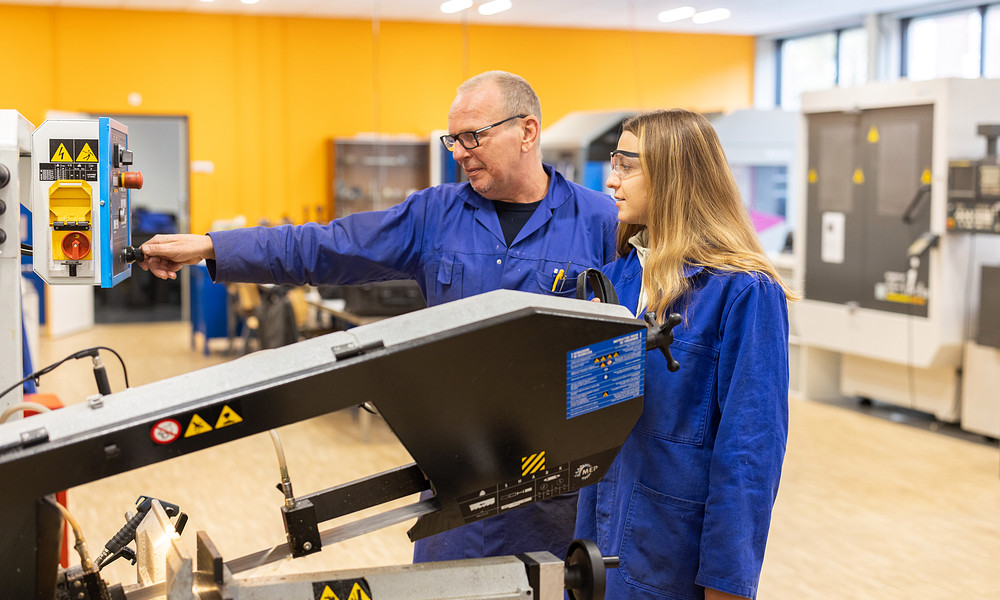Research, Design & Engineering

Research, Design & Engineering
- Level
- Language
- English
- Credits
- 30 ECTS
- Startmonths
- Start: February
- Locations
- Groningen
Do you want to tackle real-world engineering challenges and develop innovative solutions? Are you eager to sharpen your technical skills while working on a hands-on project with real impact. This semester addresses a relevant and real-world mechanical engineering problem through a 15 ECTS project, complemented by various workshops and modules. The project may focus on product or system development. Initially, a thorough problem analysis, including a literature review, will be conducted. Following this, an optimal solution will be designed, engineered, and dimensioned to meet the specified requirements. The project is carried out in close collaboration with a client. Specific technical skills will be taught through supporting modules and workshops, enabling students to successfully design and engineer a solution.
As part of the project, students will work in groups to analyse the given technical problem. During this phase, students will receive relevant, timely information on topics such as:
- Literature research
- Framing the research
- Research methods
- Plan of approach
- Project organisation
During the subsequent design and engineering phases, students will develop solutions to the problem and advise the client on the given assignment. To support this process, the following modules are scheduled: Automation & Control, Machine Engineering, and Installation Engineering. Additionally, students will receive just-in-time learning opportunities, such as:
- Design for maintenance lectures
- Design for sustainability lectures
- Guest lectures on relevant topics
- Feedback sessions with tutors and clients
- Report writing guidance
Programme structure
The programme is currently divided into four modules:
Project: Research, Design & Engineering (15 ECTS)
This 15 ECTS project addresses a professional mechanical engineering problem, encompassing both product and system-related issues. Throughout the project, students engage with the full engineering process. Initially, they conduct a problem analysis, including a literature review. Subsequently, they design and engineer a solution in a structured and methodical manner. The project is carried out in close collaboration with the client.
Machine Engineering (5 ECTS)
In this module, students study an existing machine to explore various engineering aspects. The Guide to the Application of the Machinery Directive 2006/42/EC is used to analyse the machine. Additionally, a risk analysis is conducted to identify all existing issues, malfunctions, and potential hazards. Key engineering skills covered include:
- Selection of machine components (e.g., brakes, clutches, gears)
- Determination of applicable load cases in dynamic conditions
- Strength and strain calculations for machine parts and sub-assemblies using FEM software in worst-case scenarios
Installation Engineering (5 ECTS)
This course covers the fundamentals of HVAC (Heating, Ventilation, and Air Conditioning) system design and engineering for climate control in buildings. The design process begins with room condition requirements and heating/cooling load calculations and progresses to the development of piping and ducting systems. Students gain an overview of distribution systems and components for delivering heat, cold, and fresh air. While the course does not cover heat and cold generation (e.g., chillers, heat pumps, CHP, boilers), it places particular emphasis on hydronic system design—an essential factor for energy efficiency and occupant comfort in buildings. The knowledge gained is also applicable to district heating systems and the efficient operation of heat pumps.
Automation & Control (5 ECTS)
This module introduces students to digital control programmes for industrial installations. Topics covered include:
- Fundamentals of digital electronics and programming
- Digital input and output devices
- Programming methods
- Ladder logic and other control diagrams
Students will enhance their understanding through hands-on programming exercises using industrial PLCs and Arduino microcontrollers.
Elective (5 ECTS)
Through this optional module, students can tailor their learning experience by selecting a relevant 5 ECTS module (e.g., Hydrogen & Fuel Cells) or by working on an external client project. This module can replace either Machine Engineering or Installation Engineering.
Before you can start
This programme is offered in the third year of a four-year bachelor's degree. Students must have completed 120 ECTS credits (four semesters) at the undergraduate level in the field of Mechanical Engineering.
Admission & application
Please check with your home university whether there is an agreement set up with the Hanze School that is offering the exchange programme of your choice. To apply for and be admitted for our exchange programme you should take the following steps
-
1. Be nominated by your home university
Once you have been nominated, your nomination will be checked by us and confirmed to your home university by email. You will receive your application link during our application period.
-
2. Submit your online application
Once you have been nominated by your home university you will receive a personal application link and the application instructions during our application period. The application is fully digital and documents do not have to be send by email or postal mail. Make sure you do not miss our application deadline!
-
3. Letter of Acceptance
Once you have submitted your application we will check your documents. If you have to re-submit any documents, we will let you know. We will be sending out Acceptance Letters from the beginning of May when you start in September and from the middle of October when you start in February.
Find out more about our application process and practical matters.
Frequently Asked Questions
Contact
-
Bernard Heikema



